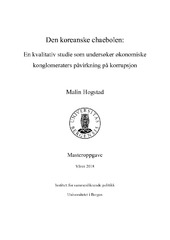| dc.description.abstract | This thesis seeks to compare South Korea and Taiwan regarding the issue of corruption. Korea and Taiwan are both previous Japanese colonies; they share a strong military legacy; and both have recently experience rapid economic and democratic development. Correspondingly, the two countries can be regarded as similar on the majority of the variables that often are used to explain corruption. Empirical and historical evidence shows that the two cases do not coincide in regard to outcome of corruption, however; according to Transparency International and the World Bank, Taiwan is seemingly relatively less corrupt compared to Korea. This makes possible the application of the most similar system design in the study of the two cases. The research question is approached by applying a qualitative research design. More specifically, I use a most similar system design and process tracing methods in order to identify causes of why Korea appear more corrupt than Taiwan. In the process of this research, I identified that the presence of economic conglomerates was identified as the independent variable that affected the two countries in terms of current levels of corruption. The outcome of my research is an expanded and more complex understanding of the various mechanisms determining corruption. Economic conglomerates are at the center of my analysis as the explanatory variable, and I investigate how it interacts with other, intervening variables to affect corruption. In turn, this thesis introduces an analysis of how different mechanisms beyond the traditional rational choice framework interplay in the explanation of corruption. Such new mechanisms include hierarchical structures, and networks. These have not received much attention in the existing literature; correspondingly, I hope my findings can contribute to broaden our theoretical understanding of why and how corruption is established and maintained. The main argument presented here is that the current one-sided academic understanding of corruption is not sufficient, and we have to apply more complex theories in the future, in order to provide more adequate analyses of corruption. This in turn will allow us to implement more multifaceted, yet coherent policies to combat the issue of corruption in the future. | en_US |
